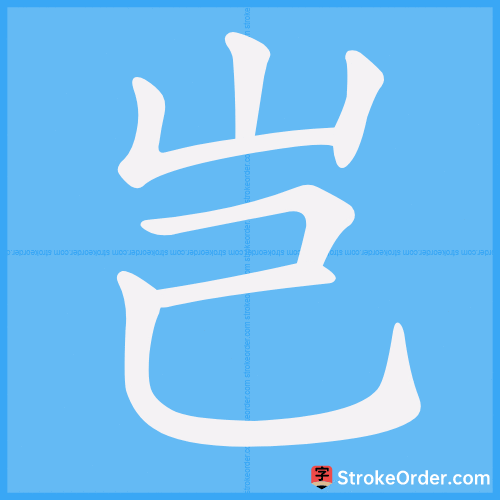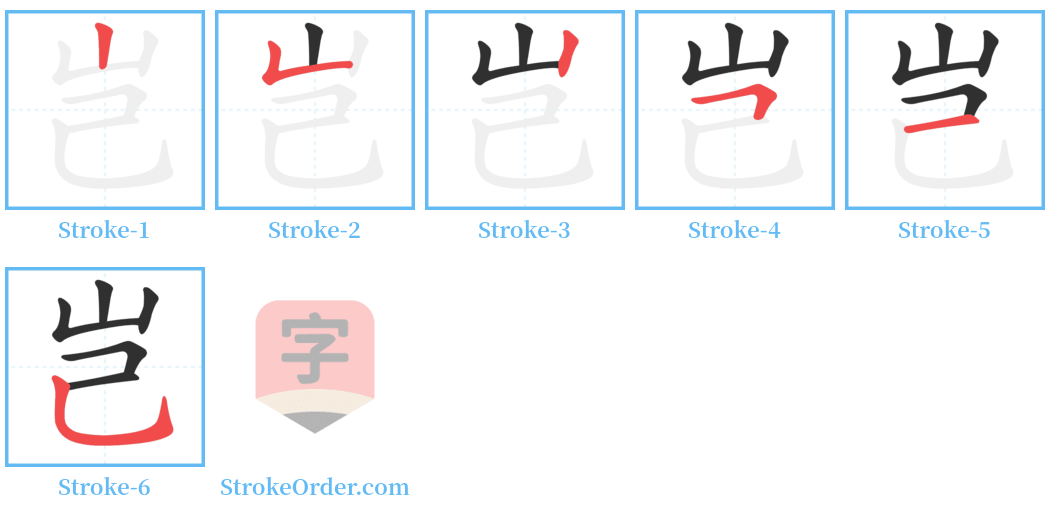岂 Stroke Order
Animated Stroke Order of 岂

Stroke Order Diagrams for 岂

Step-by-Step Handwriting Guide for 岂

Learn to Write Chinese Characters with Video Tutorials
Watch the video of writing the Chinese character "岂", learn the correct stroke order (笔顺) of the character "岂", and master the standard way of writing the character "岂".
Free Printable Handwriting Practice with Stroke Order: 岂
Printable Writing Practice Worksheet of "岂" in Portrait Orientation (Tian Zi Ge)

Printable Writing Practice Worksheet of "岂" in Landscape Orientation (Tian Zi Ge)

Information of 岂
Pinyin
qǐ、 kǎi
Radical
山
Strokes
6 strokes
Usage
★★★★★
Definition
how can it be that
岂 (qǐ)
1. A particle indicating a rhetorical question (1. where, how, like "岂敢", "岂堪", "岂可", "岂有此理"; 2. could it be, as in "岂非", "岂不", "岂有意乎").
2. Corresponds to "could it be" or "how" ([En.] how).
3. Corresponds to "much less" or "let alone" ([En.] much less; let alone).
4. An archaic form of "其".
5. Indicates a commanding tone ([En.] would).
6. Indicates estimation, suggestion, or speculation; corresponds to "perhaps" or "maybe" ([En.] perhaps; maybe).
Example Sentence: 荆卿岂无意哉。 (Could Jing Qing really be indifferent?)
岂 (qǐ)
形 (Adjective)
Similar to "恺" (kǎi). Happy and joyful ([En.] comfort; joy).
Examples:
1. "王在在镐,岂乐饮酒。" (From the "Book of Songs".)
2. "既见君子,孔燕岂弟。" (From the "Book of Songs".)
岂 (qǐ)
副 (Adverb)
Original Meaning: The joy of presenting achievements upon return from a campaign.
1. "岂" is borrowed as a virtual word, used in the middle or at the beginning of a sentence to indicate a rhetorical question.
Examples:
1. "岂非计久长。" (From "Strategies of the Warring States".)
2. "岂若吾乡邻。" (From "On Catching Snakes" by Liu Zongyuan.)
3. "岂其愤世疾邪者耶。" (From "The Seller of Oranges" by Liu Ji.)
4. "岂独一琴哉。" (From "Yuli Zi", "The Horse of a Thousand Miles".)
Other Examples:
- "岂奈(何奈,无奈)" (What can be done?)
- "岂不尔思(怎能不思念你)" (How could one not think of you?)
- "岂有他哉(表示没有其他原因)" (There is no other reason.)
3. Corresponds to "much less" ([En.] much less; let alone).
Example: "岂况(何况)" (much less).
4. An archaic form of "其".
5. Indicates a commanding tone ([En.] would).
Example: "岂不可(怎么不可以)" (How can it not be possible?).
6. Indicates estimation, suggestion, or speculation; corresponds to "perhaps" or "maybe" ([En.] perhaps; maybe).
Examples:
1. "将军岂有意乎。" (From "Records of the Three Kingdoms".)
2. "将军岂愿见之乎。" (From "Records of the Three Kingdoms".)
3. "将军岂有意乎。" (Could the general have any intention?)
Other Examples:
- "岂有(也许有)" (Perhaps there is).
1. An ancient form corresponding to "恺" (kǎi), meaning happiness.
2. An ancient form corresponding to "凯" (kǎi), meaning victorious.
岂 (qǐ)
Noun: Refers to the music played upon the triumphant return of an army. "说文解字" states: "岂, the music played upon the return from campaign."
Adjective: Joyful and happy. It's interchangeable with "恺" and "凯".
- "王在在镐,岂乐饮酒。" (From the "Book of Songs".)
- "岂安通灵台,游瀁去高翔。" (From a poem by Ruan Ji from the Three Kingdoms period.)
Input Method for 岂
Pinyin
qi3
Wubi
mnb
Cangjie
usu
Zhengma
llyy
Four Corner
22717
Unicode
U+5c82
Same Pronunciation Characters